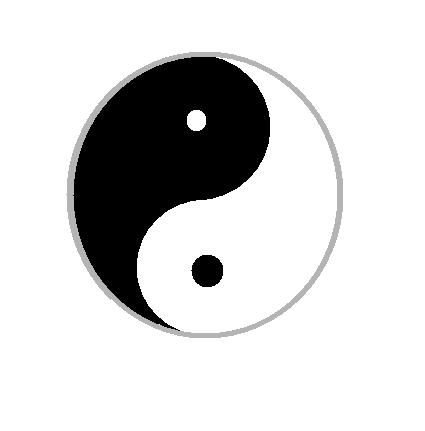Laozi's Dao De Jing 21-25 (老子道德經 21-25)
Author: Laozi (老子); translated by James Legge

There was something undefined and complete, coming into existence before Heaven and Earth. How still it was and formless, standing alone, and undergoing no change, reaching everywhere and in no danger (of being exhausted)! It may be regarded as the Mother of all things.
第二十一章
孔德之容,惟道是從。道之為物,惟恍惟惚。惚兮恍兮,其中有象﹔恍兮 惚兮,其中有物。窈兮冥兮,其中有精﹔其精甚真,其中有信。自今及古 ,其名不去,以閱眾甫。吾何以知眾甫之狀哉?以此。
Chapter 21
The grandest forms of active force
From Tao come, their only source.
Who can of Tao the nature tell?
Our sight it flies, our touch as well.
Eluding sight, eluding touch,
The forms of things all in it crouch;
Eluding touch, eluding sight,
There are their semblances, all right.
Profound it is, dark and obscure;
Things' essences all there endure.
Those essences the truth enfold
Of what, when seen, shall then be told.
Now it is so; 'twas so of old.
Its name—what passes not away;
So, in their beautiful array,
Things form and never know decay.
How know I that it is so with all the beauties of existing things? By this (nature of the Tao).
第二十二章
曲則全,枉則直,窪則盈,敝則新,少則多,多則惑。是以聖人抱一為天 下式。不自見,故明﹔不自是,故彰﹔不自伐,故有功﹔不自矜,故長。 夫唯不爭,故天下莫能與之爭。古之所謂「曲則全」者,豈虛言哉!誠全 而歸之。
Chapter 22
1. The partial becomes complete; the crooked, straight; the empty, full; the worn out, new. He whose (desires) are few gets them; he whose (desires) are many goes astray.
2. Therefore the sage holds in his embrace the one thing (of humility), and manifests it to all the world. He is free from self-display, and therefore he shines; from self-assertion, and therefore he is distinguished; from self-boasting, and therefore his merit is acknowledged; from self-complacency, and therefore he acquires superiority. It is because he is thus free from striving that therefore no one in the world is able to strive with him.
3. That saying of the ancients that 'the partial becomes complete' was not vainly spoken:—all real completion is comprehended under it.
第二十三章
希言自然。故飄風不終朝,驟雨不終日。孰為此者?天地。天地尚不能久 ,而況于人乎?故從事于道者,同于道﹔德者,同于德﹔失者,同于失。 同于道者,道亦樂得之﹔同于德者,德亦樂得之﹔于失者,失亦樂得之。 信不足焉,有不信焉。
Chapter 23
1. Abstaining from speech marks him who is obeying the spontaneity of his nature. A violent wind does not last for a whole morning; a sudden rain does not last for the whole day. To whom is it that these (two) things are owing? To Heaven and Earth. If Heaven and Earth cannot make such (spasmodic) actings last long, how much less can man!
2. Therefore when one is making the Tao his business, those who are also pursuing it, agree with him in it, and those who are making the manifestation of its course their object agree with him in that; while even those who are failing in both these things agree with him where they fail.
3. Hence, those with whom he agrees as to the Tao have the happiness of attaining to it; those with whom he agrees as to its manifestation have the happiness of attaining to it; and those with whom he agrees in their failure have also the happiness of attaining (to the Tao). (But) when there is not faith sufficient (on his part), a want of faith (in him) ensues (on the part of the others).
第二十四章
企者不立﹔跨者不行﹔自見者不明﹔自是者不彰﹔自伐者無功﹔自矜者不 長。其在道也,曰:餘食贅形。物或惡之,故有道者不處。
Chapter 24
He who stands on his tiptoes does not stand firm; he who stretches his legs does not walk (easily). (So), he who displays himself does not shine; he who asserts his own views is not distinguished; he who vaunts himself does not find his merit acknowledged; he who is self-conceited has no superiority allowed to him. Such conditions, viewed from the standpoint of the Tao, are like remnants of food, or a tumour on the body, which all dislike. Hence those who pursue (the course) of the Tao do not adopt and allow them.
第二十五章
有物混成,先天地生。寂兮寥兮,獨立而不改,周行而不殆,可以為天地 母。吾不知其名,強字之曰道,強為之名曰大。大曰逝,逝曰遠,遠曰反 。故道大,天大,地大,人亦大。域中有四大,而人居其一焉。人法地, 地法天,天法道,道法自然。
Chapter 25
1. There was something undefined and complete, coming into existence before Heaven and Earth. How still it was and formless, standing alone, and undergoing no change, reaching everywhere and in no danger (of being exhausted)! It may be regarded as the Mother of all things.
2. I do not know its name, and I give it the designation of the Tao (the Way or Course). Making an effort (further) to give it a name I call it The Great.
3. Great, it passes on (in constant flow). Passing on, it becomes remote. Having become remote, it returns. Therefore the Tao is great; Heaven is great; Earth is great; and the (sage) king is also great. In the universe there are four that are great, and the (sage) king is one of them.
4. Man takes his law from the Earth; the Earth takes its law from Heaven; Heaven takes its law from the Tao. The law of the Tao is its being what it is.
- Log in to post comments




Recent comments